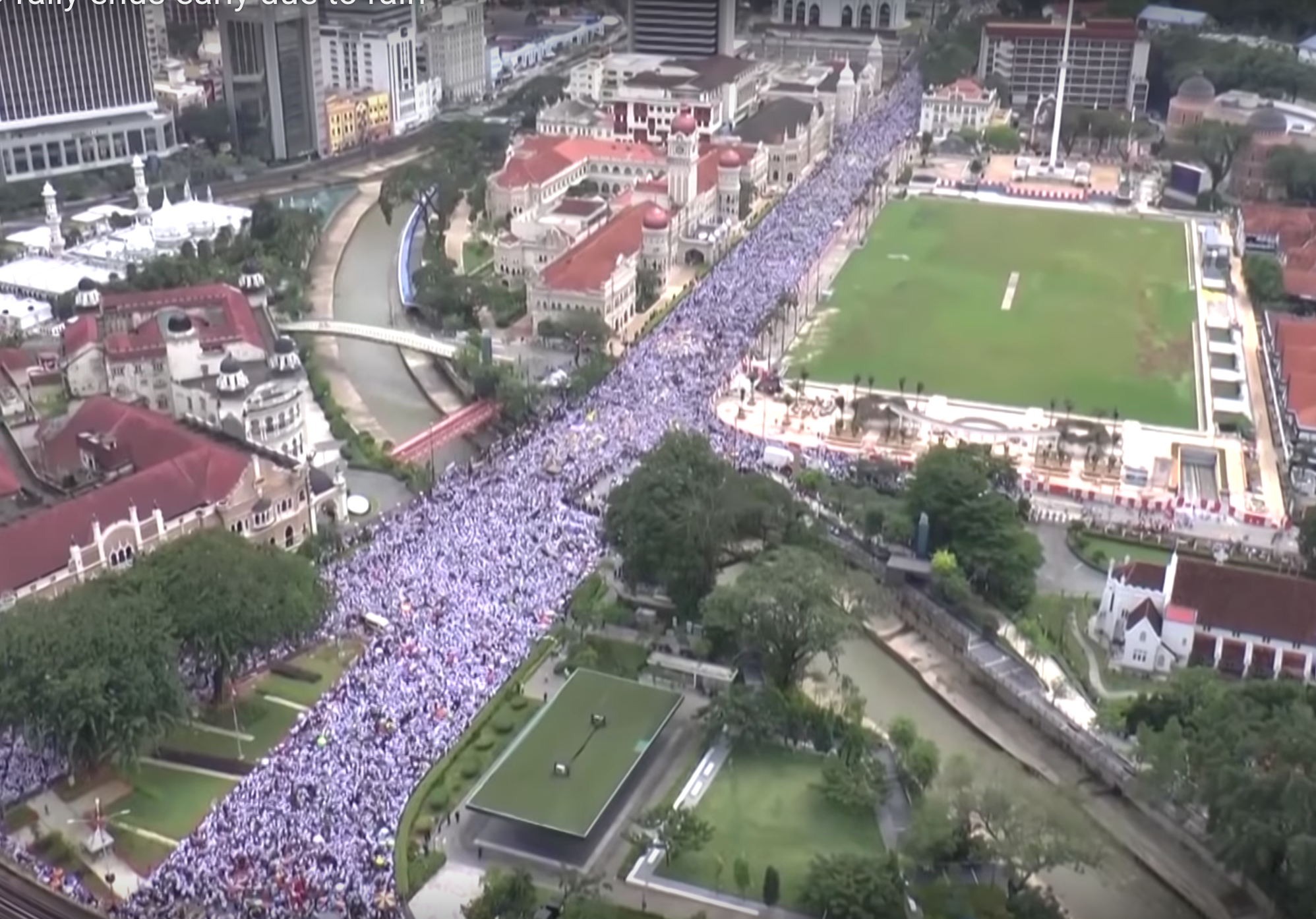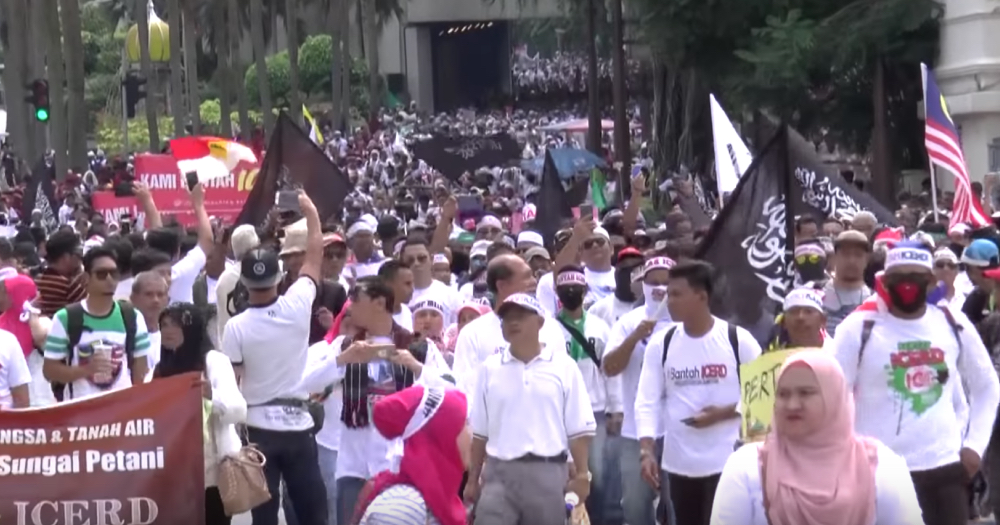An estimated 55,000 Malaysians turned up on the streets of Kuala Lumpur in a sea of white on Saturday, Dec. 8.
 Screenshot via The Star Online/YT
Screenshot via The Star Online/YT
Their goal?
To make it clear they are against the current Malaysia government adopting an international convention that seeks to end racial discrimination.
Former Malaysian prime minister Najib Razak and his wife, Rosmah Mansor, attended the rally as well.
On Dec. 7, in light of the possibility of skirmishes taking place, Singapore's Ministry of Foreign Affairs advised Singaporeans to avoid non-essential travel to KL.
Here's what the fuss surrounding the anti-ICERD protests, which it has come to be known, is about.
What is ICERD?
The International Convention on the Elimination of All Forms of Racial Discrimination (ICERD) is a United Nations (UN) convention against racial discrimination.
Although ICERD is legally binding, it is not readily enforced as the UN does not have an enforcement arm.
How did protests against ICERD start?
Malaysia's Prime Minister Mahathir Mohamad started the ball rolling when he addressed the UN General Assembly on Sept. 28 this year.
According to New Straits Times, he said that the new Pakatan Harapan (PH) government would "ratify all remaining core UN instruments related to the protection of human rights".
Ratifying the ICERD was part of the PH manifesto.
Who stoked the flames of the protest?
One of the prolific opponents, of which there were many, was Rembau MP and former Umno Youth Chief Khairy Jamaluddin.
He expressed his concerns that the ratification of ICERD would mean the end of bumiputera privileges.
Malay-language newspaper Utusan Malaysia, which has a history of stoking racist sentiments, then reported that ICERD would erode the special position of Malays in the country.
All of which were essentially not true.
This sparked a series of protests from large groups of Malaysians.
Malaysia's main opposition parties United Malays National Organisation (Umno) and Parti Islam Se-Malaysia (PAS) then announced that they would be organising a huge rally against ICERD.
And they managed to rally their support base to show up in force.
Protest rally became a thanksgiving rally?
Following the massive domestic backlash, the Malaysian government announced on Nov. 23 that they would not be ratifying ICERD after all.
PAS then declared that the rally would be rebranded as an "assembly of the rakyat's victory and gratitude in rejecting ICERD" instead, reported Malay Mail.
What was the rally really about?
Faisal Hazis of the National University of Malaysia told Malay Mail that the anti-ICERD rally was not really about ICERD.
Rather, he said ICERD was simply a convenient tool for Umno and PAS.
They are making use of it to further their political purpose, and that the rally was just another example of Umno playing up racial politics.
James Chin, director of the Asia Institute at the University of Tasmania, told The Straits Times that the rally was an opportunity for Umno and PAS to show that they are "still relevant".
However, Malay Mail posited that participants of the rally were not necessarily racist, and that the large turnout might point to the discontent festering in the Malay community instead.
"This discontent may be rooted in insecurities owing to financial challenges with income inequalities and with a debt-laden federal government forced to be more mindful of spending on handouts and assistance."
Why did the Malaysian government decide not to ratify ICERD?
Because of politics.
The decision not to ratify ICERD was seemingly made in response to growing pressure from the majority Malay population.
According to The Malaysian Insight, government sources revealed that the key reasons were the "fear of losing Malay support and facing attacks from the opposition".
The government's U-turn has been hugely criticised by the opposition, with Khairy calling it "embarrassing" and even demanding Foreign Affairs Minister Saifuddin Abdullah to step down.
Member of Parliament and Democratic Action Party (DAP) member Charles Santiago told South China Morning Post the reversal signalled to the opposition that race-based politics are still being rewarded in Malaysia.
"This is the only way Umno knows how to rile people up, and is part of its attempts to hold on to the Malay vote.
By giving in, we have given them more control over the Malay base."
However, according to SCMP, Mahathir denied the rally had a racial undertone.
Citing a study by independent pollster Merdeka Centre, ST reported that Umno and PAS won a larger share of the Malay vote in the general election in May.
PH only won one-third of the Malay votes at that time.
Which countries haven't ratified ICERD?
According to Malaysiakini, Malaysia remains one of only 18 countries in the world which have not ratified the Convention, joining North Korea, South Sudan and Myanmar.
It is also one of only two Muslim-majority countries in the world that have yet to ratify it. The other one is Brunei.
Countries such as Saudi Arabia, Iran, Iraq and Indonesia are among the 55 Organisation of Islamic Cooperation (OIC) countries that have ratified ICERD.
This is why Santiago said the opposition party PAS' basis for rejecting ICERD due to Islamic reasons is "illogical", reported SCMP.
Also, it is possible for a country to ratify ICERD with reservations, so the convention would not supersede its constitution.
Oceania countries such as Fiji and Tonga have done this to protect their indigenous populations.
In total, 179 countries have already ratified ICERD.
Singapore did so on Nov. 27 2017, reported Channel NewsAsia.
Win for democracy, setback for Malaysia government?
The rally is seen by some as a win for democracy in the country, but a setback for the government.
Malay Mail posited that Malaysians were able to exercise their right to the freedom of assembly during the rally.
Iskandar Puteri MP and DAP stalwart Lim Kit Siang also wrote in a commentary on Malaysiakini that the rally was a "victory for New Malaysia" as it displays the PH government's respect for the "rights of the people to speak and assemble peacefully".
However, on the other hand, he said the rally represents a "setback" for the government as they had not handled the issue well.
This is because they had "allowed the organisers of the rally to hijack, twist and distort the ICERD debate with the toxic politics to incite baseless fears that the treaty is anti-Malay, anti-Islam".
Besides ICERD, Malaysia has yet to ratify five of nine core human rights UN conventions.
Top image via The Star Online/YT
Here's a totally unrelated but equally interesting event that you might want to check out:
If you like what you read, follow us on Facebook, Instagram, Twitter and Telegram to get the latest updates.
